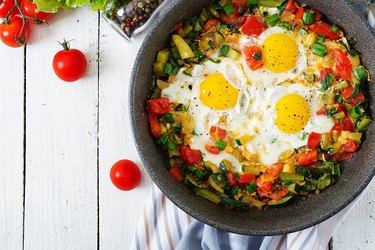
Finding a book on nutrition that's thought-provoking, helpful and interesting can be a huge challenge, especially with so much conflicting information out there. So, we did some of the work for you and asked experts to recommend their favorite nutrition reads.
But don't expect to find any crash-diet how-to books on this list. Here, we name books that teach you how to eat a balanced diet, make you aware of eating habits that may be sabotaging weight loss, provide yummy and nutritious recipes and more.
Video of the Day
Video of the Day
1. "In Defense of Food," by Michael Pollan
New York Times best-selling author Michael Pollan pushes back against nutrient-by-nutrient thinking and champions an old-fashioned approach to eating in his book, In Defense of Food.
"It's quite challenging to put your best healthy eating advice into one sound bite, but Michael Pollan comes pretty close to being able to do that in 'In Defense of Food,' where he says, 'Eat food. Not too much. Mostly plants,'" Jackie Newgent, RDN, culinary nutritionist and author of The All-Natural Diabetes Cookbook, says.
Pollan advocates for a diet rich in unprocessed foods and instructs readers on how to choose healthy foods and how to eat them (Hint: It doesn't involve sitting in front of the TV). "I love that Pollan reminds readers about what 'real' food really is," Newgent says. "Sometimes people get so caught up in the latest nutrition craze that they forget what healthy, sound eating is all about."
2. “The Academy of Nutrition and Dietetics Complete Food and Nutrition Guide,” by Roberta Larson Duyff
It's not always easy to find trustworthy nutritional information — in fact, it can often be a total pain in the you-know-where. So, for all of your calorie- and macronutrient-counting needs, Newgent recommends The Academy of Nutrition and Dietetics Complete Food and Nutrition Guide, by Roberta Larson Duyff.
"You actually don't have to read it word for word. You can use the index kind of like a Google search for nutrition info, just in a 'real' form," she says. "And the best part is you don't have to filter through lots of questionable, pseudo-scientific results. You can rely on the fact-based nutrition info in this very big book. Plus, it's presented in a consumer-friendly way so you can instantly make sense of it and put the advice into practice."

3. “The Protein-Packed Breakfast Club,” by Lauren Harris-Pincus
Eating protein in the morning can be an important way to ensure that you stay full until lunch. However, that's much easier said than done. "After 20 years of counseling clients, the most common mistake I repeatedly observed was either breakfast skipping or consuming a morning meal without adequate protein and fiber to properly fuel the body at the time of the day demanding a large portion of your mental and physical energy," says Lauren Harris-Pincus, RDN, founder of NutritionStarringYOU.com.
In her cookbook, The Protein-Packed Breakfast Club, Harris-Pincus provides simple, (mostly) make-ahead breakfast recipes that are high in both protein and fiber. One major bonus? All of her recipes are 300 calories or less.
4. “Why Humans Like Junk Food,” by Steven Witherly, Ph.D.
Have you ever wondered why you can't resist that piece of office birthday cake, no matter how committed you are to your weight-loss goals? Why Humans Like Junk Food, by Steven Witherly, Ph.D., not only opens your eyes to the mechanisms that make you crave less-than-healthy foods, it also teaches you how make healthy food tastier.
"People believe it is their fault that they [have] overweight or [obesity], when in fact, there is a lot working against us that we're not aware of," says Ilana Muhlstein, RD, co-creator of the 2B Mindset. Dr. Witherly's book "shows how foods like Oreos are designed to not only be delicious, but absolutely addicting! It's helpful to learn that you are not the only one who has finished a package and felt guilty," she says.
5. “Mindless Eating: Why We Eat More Than We Think,” by Brian Wansink, Ph.D.
Your appetite isn't just triggered by the look and taste of your food, it's also impacted by everything from the size of your plate to the color of the walls. In his book, Mindless Eating: Why We Eat More Than We Think, Brian Wansink, Ph.D. explains the surprising factors that contribute to overeating.
Mindless Eating is "extremely helpful for helping you realize where your unwanted weight gain has come from," Muhlstein says. "Most of the time people think that they are eating fairly healthy and trying, yet can't explain why they seem to keep gaining weight year after year."